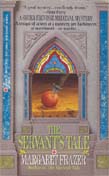A
MEDIEVAL YEAR IN ENGLAND:
JANUARY Janiveer
Freeze
the pot upon the
fire.
As the day lengthens
The cold strengthens.
If grass grows in Janiveer,
It grows the worse for all the year.
If January calends be summerly gay,
‘Twill be winterly weather till the calends of May.
A January spring
Is worth naething.
This
is the coldest of the months, with the cold expected to increase as the
month goes on and warm weather considered more treacherous than good. On
the land this is something of a slack time for work but preparations
for spring go on. Dung is gathered from barns and privies to be spread
on the fields while the ground is frozen. Wood is cut for fuel. Tools
and hedges are repaired; walls are repaired or made. Seed grain is
checked to be sure it is keeping well, and ewes are readied for lambing
time. In less harsh parts of England, lambing may begin now since ewes
are milked from lambing to Lammas (August 1) and the earlier they lamb
the longer they can be milked. Cows are expected to be calving now,
between Christmas and Lent, and sows are breeding. In barns threshing
of last harvest’s grain continues when the weather is too cold for
working outside. For hunters, the boar, roe deer, hare, wolf, and
fox are now fair game. Fresh foods are few, mostly only what has been
salted away or dried are easily available. Hopefully there is enough
to last until summer. But this is a month of holidays that help to ease the cold and dark of the short days and long nights. January
1: The day of the Circumcision of Christ. Also popularly known as New
Year’s Day. Though officially, in church and government records, the
year-date will not change until March 25, this is popularly held to be
the year’s beginning, with gift-giving and celebrations. The custom of
Wassail (from the Saxon phrase Wass Hael:
To your health) is very old – the lord drinks first to everyone’s
health from the wassail bowl that is then passed to the next most
important person present and on around the household in order of
precedence Ceremonies of the day vary from place to place. The church
tries repeatedly but unsuccessfully to outlaw the custom of men dressed
in animal skins and heads running through the streets. January
5: Twelfth Night Eve. A time for rituals blessing the fields for the
coming year. At night the men light bonfires in the fields and stand
around them drinking wassail to the farm’s health in ale or cider,
shouting and cheering to scare away evil spirits. Every field needs to
have a fire and circle, and when all have been wassailed, the men
return home to feast before going out again, now to all the buildings
and beasts to drink to their luck and health. January 6:
Epiphany. The Twelfth Day and Night after Christmas and almost as
major a holiday. It ends the Christmas season. Today all house
decorations should be down lest they bring ill-luck, though they may
stay in churches until Candlemas. There is feasting and sometimes
bonfires and traditional games that depend more on luck than skill.
Everywhere there is a special cake baked with a bean in it, and whoever
finds the bean in his piece is King of the Bean and his word is law
until the day ends. Sometimes there is a Queen, either by his choice
or by lot, and a “royal” court. January 7: St. Distaff Day. A
nonsense day named for a fictional saint, when people are supposed to
be returning to work after the Christmas holidays but instead indulge
in one more day of jokes and trickery. The first Monday after
Twelfth Day is Plough Monday. Ploughmen – whose hardest time of the
year will soon begin – decorate themselves with ribbons and take a
plough likewise decorated and dressed up with ribbons in procession
through the neighborhood. Besides themselves and the Fool Plough,
there are a man dressed as an old woman named Bessy, and a Fool, and
sometimes morris dancers. Together they collect money for candles
called ploughlights to put in the church for blessing of their work.
The plough itself may be brought into the church for the priest’s
blessing, and there is feasting afterward. January 14: St.
Hilary Day. Traditionally supposed to be the year’s coldest day. Also
about now the law courts reconvene for Hilary Term. January 20:
St. Agnes Eve. Tonight young women who wish to dream of their future
beloved should perform certain rituals to win their dream, but the
rituals differ from place to place. January 24: Conversion of
St. Paul. The weather today is supposed to forecast the weather of the
coming year. Fair weather means a prosperous year; snow or rain
foretell an unfruitful one; clouds warn of mortality among the
livestock; winds mean there will be war. 
New Year's 1434 - Margaret |